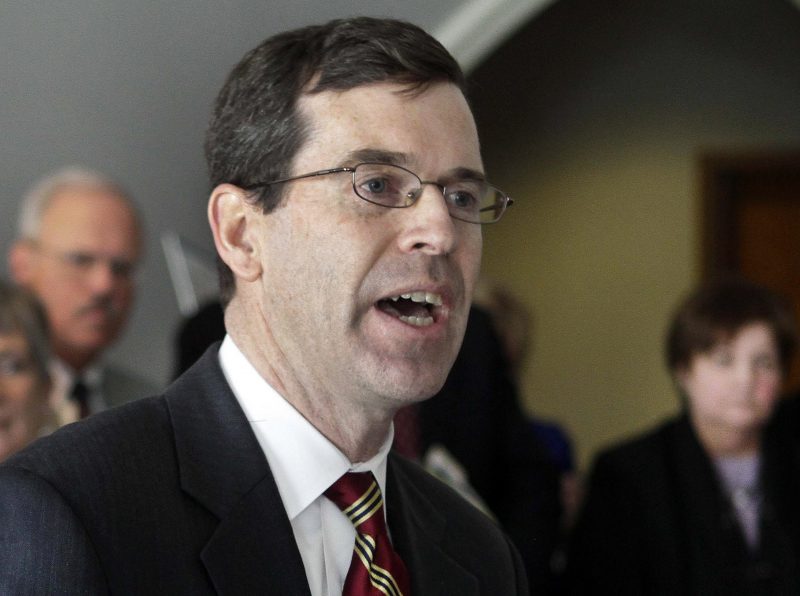One of President Biden’s nominees for a federal appeals court position withdrew from consideration on Thursday after months of rare resistance from Democrats in the Senate, who saw the candidate as controversial.
Biden nominated former New Hampshire attorney general Michael Delaney to the 1st U.S. Circuit Court of Appeals in January. But the nomination languished as Congress members from both sides of the aisle raised concerns about Delaney’s legal record.
Delaney came under criticism from Democrats and Republicans over his controversial stances defending a parental notification law for abortion and representing a private school amid a sexual assault scandal.
Democrats who control the Senate Judiciary Committee held the nomination over several times and never brought it up for a vote.
In a letter to the president obtained by The Washington Post, Delaney announced his withdrawal and said he was “honored” that the president chose him for the position. He also noted that he was “deeply indebted” to New Hampshire Democratic Sens. Jeanne Shaheen and Maggie Hassan for continuing to support his nomination before the Senate Judiciary Committee despite the stalling.
“I am most respectful of the Senate’s constitutional role in considering my nomination,” he wrote. “At this time, I believe it is appropriate for me to withdraw my name from consideration for this position to advance the important work of the federal judiciary.”
Shaheen and Hassan released a joint statement Thursday afternoon echoing Delaney’s disappointment.
“We strongly supported Michael Delaney’s nomination to serve as a First Circuit judge. We know personally his strong character and commitment to justice, and he earned the support of New Hampshire and national leaders, from the former Director of the Office on Violence Against Women under President Obama to New Hampshire Supreme Court justices appointed by members of both parties,” the statement read. “We disagree with the criticism that has been leveled against him, and we are disappointed that it got in the way of confirming a highly qualified individual.”
White House spokesman Andrew Bates defended Biden’s initial choice of Delaney, saying the president had put forward “a deeply qualified nominee, with a long and distinguished career in public service.”
The White House, Bates said in a statement, will now consult with Shaheen and Hassan to identify a new nominee for the role.
“The President looks forward to working with Democrats and Republicans to build on his historic record of nominating and confirming men and women who are dedicated to the rule of law and who continue to break barriers by representing the diversity of our country,” Bates added.
Delaney, a Democrat, was appointed New Hampshire deputy attorney general in 2004 and served through 2006. He then worked for the state’s governor, who, in 2009, appointed him attorney general. Delaney’s term ended in March 2013.
Delaney had previously been grilled by members of the committee. “It was a pretty rough hearing, no question,” the committee’s chairman, Sen. Richard J. Durbin (D-Ill.) later told CNN. After his appearance, Delaney sought to downplay his role in defending that state law. Writing to senators, Delaney said that he had “extremely limited involvement” in the case, which unfolded when he was a deputy attorney general.
“I did not write the petition or the briefs … I did not represent the State of New Hampshire at the oral argument … I had no role in the appeal … and I did not represent the State of New Hampshire in the underlying lawsuit,” he wrote.
Delaney also faced criticism for his role in representing a New Hampshire boarding school amid an investigation into the sexual assault of a student there.
In his written statement to senators, “I assisted the judge, prosecutor and defense counsel to coordinate a so-called jury view, or jury trip, to the school at the beginning of the trial. That was my only role in connection with the trial.”
Later, when the plaintiff filed a civil suit against the school, Delaney wrote that “I filed an answer to the complaint on behalf of the school,” and that “no depositions of any parties or witnesses were conducted” and the parties “resolved the case through a confidential settlement agreement.”
On Thursday, the top Republican on the committee, Sen. Lindsey O. Graham (R-S.C.), said in a statement that Delaney’s answers to the committee were “‘beyond the pale’ bad.”
“I oppose his nomination,” Graham said in a statement. “His answers to questions from committee members, regarding a lawsuit where he represented a private school accused of allowing sexual harassment and assault of a minor student, were ‘beyond the pale’ bad. The parents of the victim involved in that litigation have come to the committee continuously as the nomination has been brought up. I understand and share their concerns.”
Liz Goodwin contributed to this report.








